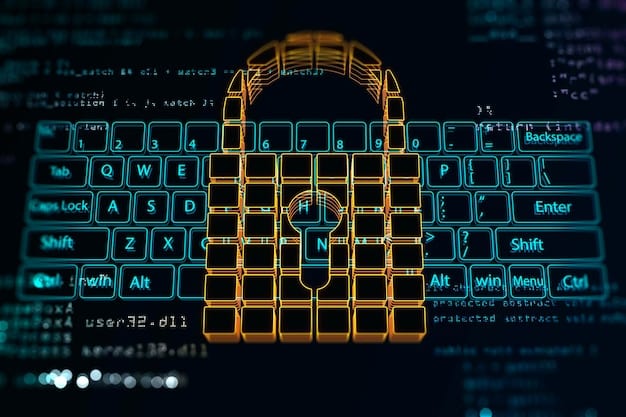Blockchain Security Audits: Protecting Your US Project

Blockchain security audits are crucial for identifying vulnerabilities in blockchain projects. Choosing the right firm ensures comprehensive protection against potential threats and compliance with US regulations, safeguarding your investment and user trust.
Blockchain technology, while revolutionary, is not immune to security vulnerabilities. For projects based in the US, ensuring robust security is paramount. This is where blockchain security audits come into play. Choosing the right firm and understanding the audit process are essential steps to protect your project from potential exploits and maintain the trust of your users.
Understanding the Importance of Blockchain Security Audits
Blockchain security audits are in-depth reviews of your project’s code, architecture, and implementation. They identify potential vulnerabilities that could be exploited by malicious actors. These audits are particularly critical for US-based projects due to increasing regulatory scrutiny and the potential for significant financial and reputational damage from security breaches.
Why are audits so important?
Audits provide an objective assessment of your project’s security posture, highlighting weaknesses that might be missed during internal development. They help to ensure that your smart contracts and other blockchain components are functioning as intended and are resistant to common attack vectors.
- Prevent financial losses: By identifying and fixing vulnerabilities, you can prevent costly exploits and theft of funds.
- Maintain user trust: Demonstrating a commitment to security builds confidence in your project and encourages user adoption.
- Compliance with regulations: As blockchain technology becomes more mainstream, regulatory bodies are increasing their oversight. Audits can help you meet compliance requirements and avoid legal issues.
- Enhance project reputation: A successful audit can be a valuable marketing tool, showcasing your project’s security and stability to potential investors and users.
Ultimately, investing in blockchain security audits is an investment in the long-term success and sustainability of your project.
Key Considerations When Choosing a Blockchain Security Audit Firm
Selecting the right audit firm is crucial. Not all firms have the same level of expertise or experience. It’s vital to consider several factors to ensure you choose a firm that can effectively assess your project’s security needs.

Expertise and Experience
Look for a firm with a proven track record of auditing similar projects. Ask about their experience with the specific blockchain technology you’re using and their familiarity with common vulnerabilities in that ecosystem.
Consider these aspects:
- Years of experience: How long has the firm been providing blockchain security audit services?
- Team qualifications: What are the qualifications and certifications of the auditors? Do they have relevant experience in cybersecurity and blockchain development?
- Case studies: Can the firm provide case studies or examples of successful audits they’ve performed?
A firm with deep expertise and relevant experience will be better equipped to identify and address potential security risks in your project.
Evaluating the Audit Process and Methodology
The audit process itself is just as important as the firm you choose. A comprehensive audit should involve a combination of automated testing and manual code review, tailored to the specific needs of your project.
What should a thorough audit include?
A robust audit process should include several key stages, from initial scoping to final report delivery. Understanding these stages will help you evaluate the thoroughness of a firm’s methodology.
- Scoping and planning: The firm should work with you to define the scope of the audit and develop a detailed plan.
- Automated testing: Automated tools can quickly identify common vulnerabilities and coding errors.
- Manual code review: Experienced auditors should manually review your code to identify more complex vulnerabilities that automated tools might miss.
- Penetration testing: This involves simulating real-world attacks to test the resilience of your project’s security measures.
- Reporting and remediation: The firm should provide a clear and detailed report of their findings, along with recommendations for remediation.
By understanding the audit process, you can ensure that the firm you choose is taking a comprehensive and rigorous approach to security testing.
Understanding Reporting and Remediation Strategies
The final report is a critical deliverable of the audit process. It should provide a clear and actionable overview of the identified vulnerabilities, along with recommendations for fixing them. The best firms will also offer support in implementing these recommendations.
What makes a good audit report?
A good audit report is not just a list of vulnerabilities; it provides context, severity ratings, and actionable recommendations. It should also be easy to understand for both technical and non-technical audiences.
- Clear and concise language: The report should avoid technical jargon and be written in a way that’s easy to understand.
- Severity ratings: Each vulnerability should be assigned a severity rating (e.g., critical, high, medium, low) to help you prioritize remediation efforts.
- Actionable recommendations: The report should provide specific steps you can take to fix each vulnerability.
- Supporting documentation: The report should include supporting documentation, such as code snippets and screenshots, to illustrate the vulnerabilities.
Effective reporting and remediation strategies are essential to ensure that the vulnerabilities identified during the audit are addressed promptly and effectively. This ensures the security of your blockchain security audits project.

Legal and Regulatory Compliance in the US for Blockchain Projects
For US-based blockchain projects, legal and regulatory compliance is a growing concern. Understanding the relevant laws and regulations is essential to avoid legal issues and maintain a good standing with regulatory bodies.
Staying compliant in the US
The regulatory landscape for blockchain technology is constantly evolving. It’s essential to stay informed about the latest developments and work with legal counsel to ensure compliance.
Key considerations might include:
- Securities laws: If your project involves the issuance of tokens, you may need to comply with securities laws.
- Data privacy laws: If your project collects personal data, you’ll need to comply with data privacy laws like GDPR (if you have European users) and CCPA (for California residents).
- Anti-money laundering (AML) regulations: If your project involves financial transactions, you’ll need to comply with AML regulations.
A reputable audit firm can assist you in navigating the compliance landscape and ensure that your project adheres to all relevant regulations. A key component of such action is blockchain security audits.
Budgeting for Blockchain Security Audits
The cost of a blockchain security audit can vary depending on the size and complexity of your project, the scope of the audit, and the firm you choose. It’s essential to budget appropriately for security audits and view them as a necessary investment in the long-term success of your project.
What factors influence the cost?
Understanding the factors that influence the cost of an audit can help you make informed decisions and avoid surprises.
- Project size and complexity: Larger and more complex projects will require more time and resources to audit.
- Scope of the audit: A more comprehensive audit will cost more than a basic one.
- Firm’s expertise and experience: Firms with more expertise and experience typically charge higher rates.
- Reporting and remediation support: Firms that offer extensive reporting and remediation support may charge more.
Before engaging an audit firm, get a detailed proposal that outlines the scope of the audit, the estimated cost, and the deliverables. Doing so will ensure that the blockchain security audits are adequately funded and don’t negatively impinge on the project.
| Key Point | Brief Description |
|---|---|
| 🛡️ Audit Importance | Essential for vulnerability detection and regulatory compliance. |
| 🔍 Firm Selection | Prioritize firms with relevant expertise. |
| 📝 Audit Process | Automated & manual code reviews with reporting. |
| ⚖️ Compliance | Adhere to US laws for projects. |
Frequently Asked Questions
They are crucial for identifying vulnerabilities, ensuring regulatory compliance, and protecting against potential financial losses and reputational damage, adhering to US regulations.
Focus on their expertise, experience with similar projects, qualifications of their team, and their methodology for conducting audits.
It involves scoping, automated testing, manual code review, penetration testing, and detailed reporting with actionable remediation recommendations.
Stay informed about securities laws, data privacy laws, and anti-money laundering (AML) regulations, and consult with legal counsel when necessary.
The project’s size and complexity, the audit’s scope, the firm’s expertise, and the extent of reporting and remediation support influence the ultimate cost.
Conclusion
Securing your blockchain project with comprehensive blockchain security audits: How to Choose the Right Firm and Protect Your US-Based Project is not merely an option but a necessity. By choosing the right audit firm, understanding the audit process, and addressing the identified vulnerabilities, you can instill confidence in your users, stakeholders and investors.





